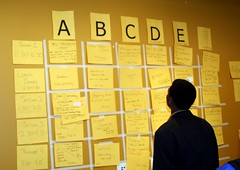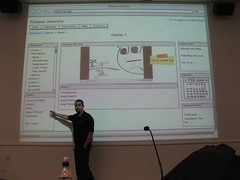Moodle Moot 2010

On 13-14 April I attended Moodle Moot 2010, hosted by ULCC at the University of London’s Senate House.
I didn’t find it as enlightening as last year’s Moot at Loughborough, but it had its moments, and I believe my colleagues were luckier in their choice of parallel sessions, as further posts here may reveal.
The first keynote was by Sugata Mitra, speaking about his “Hole in the Wall” studies. His presentation was excellent and inspiring, and can be seen on the MoodleMoot videos page, but as he’s done it many times before and much has been written about it already, I don’t really need to add. Later, Martin Dougiamas, on Skype from New Zealand, gave his now-traditional “What’s in Moodle 2.0” presentation, which was pretty much the same as last year’s as far as I can remember.
As for the parallels, not a lot to report, but a couple of presentations caught the eye. Eoin Campbell highlighted the clumsiness of the Moodle question-editing interface, and introduced a way to allow teachers to quickly and easily create quizzes by entering the questions, answers and feedback into a table in Word, and then converting that to Moodle questions at the press of a button (http://www.moodle2word.net/).
Pieter van der Hijden talked about the potential of Moodle for running educational games and simulations. It was surprising how much of the scaffolding required to build a simulation could be supported using basic Moodle features, but what’s missing at this stage is the ability for users to store variables within Moodle, and a simple scripting language to allow those variables to be processed. These are pretty fundamental to simulation, and it doesn’t look like they will be native to Moodle any time soon. I did wonder, though, whether one couldn’t just use JavaScript and cookies to get around this limitation.
Overall: not bad. ULCC did a good job of running the show. I especially liked the no-nonsense approach to the evening entertainment, consisting of canteen-style tikka masala, a pub quiz and a free bar all night.
Steve




 As you may have heard, the first LSE Teaching Day will take place on Tuesday 9 June. School director
As you may have heard, the first LSE Teaching Day will take place on Tuesday 9 June. School director  The
The  MoodleMoot UK 2009
MoodleMoot UK 2009




